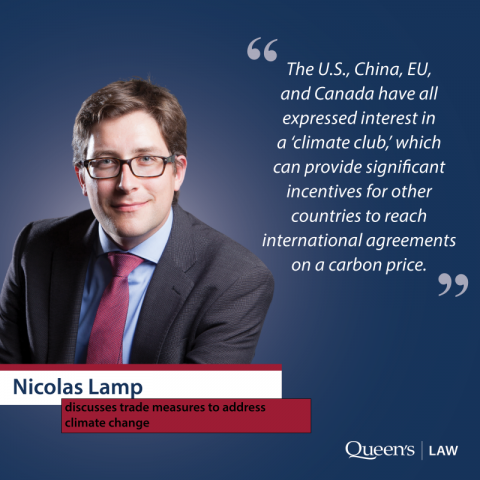
Part two of an eight-part series featuring legal insights from Queen’s Law scholars and practitioners
Trade measures can help countries strategize about emission reduction
Professor Nicolas Lamp sees trade measures as important policy tools – incentives for countries to pursue carbon reduction targets plus deterrents to countries being lax about reducing or regulating carbon emissions.
“The European Union is in advanced discussions about implementing a carbon border tax adjustment to avoid carbon leakage and ensure its own industries are not at a competitive disadvantage,” he says. “If the EU imposes some form of carbon adjustment, then other countries have a commercial incentive to engage in emission-reduction strategies.”
“Carbon leakage” describes an increase in greenhouse gas emissions in one part of the world resulting from a reduction in another part. This can happen if energy-intensive industries relocate from countries with strong green regulations to countries with weaker or no such regulations, and if the EU or Canada, for example, are inundated with cheaper imports from countries with weaker climate policies.
If a carbon border tax adjustment were implemented here, the government would determine, when an import arrived, whether the country producing it had an equivalent price on carbon. “If that country’s price was lower than ours, Ottawa would levy the difference as a tax on the import,” Lamp explains.
In early March, U.S. climate envoy John Kerry cautioned that a carbon border tax adjustment should be a last resort. The Canadian government has been exploring the imposition of a border carbon adjustment as well, and in August launched consultations on the subject.
Another proposed solution to carbon leakage would be to set up a “club” of countries with similar climate policies. They would freely trade with each other while imposing a carbon tariff on all other countries. “The U.S., China, EU, and Canada have all expressed interest in a climate club, which can provide significant incentives for other countries to reach international agreements on a carbon price,” Lamp says.
Trade measures may also have an impact on fossil-fuel subsidies. “Canada and other developed countries have paid massive subsidies to help companies explore for oil and gas,” he explains. “Trade regimes like the World Trade Organization have a lot of experience tackling subsidies. WTO Member countries are currently attempting to agree on reductions to subsidies that promote unsustainable fishing. I hope that these negotiations can serve as a model for dealing with fossil fuel subsidies, with countries agreeing to reduce and gradually eliminate subsidies to producers.”
Professor Nicolas Lamp is an international trade law expert and co-author of Six Faces of Globalization: Who Wins, Who Loses, and Why It Matters (Harvard University Press, 2021).
Watch for the next stories in this series featuring our experts’ opinions on five other areas – environmental, financial, insurance, Indigenous rights, and the energy sector – and their concluding remarks.
Read part one of this series:
“Constitutional authority to address humanity’s existential threat,” with insights from of Professors Cherie Metcalf and Nicolas Lamp.
By Mark Witten